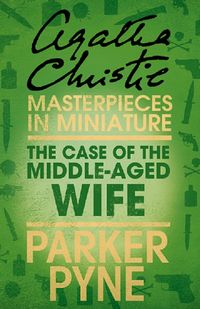Kitap dosya olarak indirilemez ancak uygulamamız üzerinden veya online olarak web sitemizden okunabilir.
Kitabı oku: «The Case of the Middle-Aged Wife: An Agatha Christie Short Story»
THE CASE OF THE MIDDLE-AGED WIFE
A Short Story
by Agatha Christie

Copyright
This short story is entirely a work of fiction. The names, characters and incidents portrayed in it are the work of the author’s imagination. Any resemblance to actual persons, living or dead, events or localities is entirely coincidental.
Published by HarperCollinsPublishers Ltd 1 London Bridge Street London SE1 9GF
‘The Case of the Middle-Aged Wife’ was first published as ‘The Woman Concerned’ in Woman’s Pictorial, 8 October 1932.
This ePub edition published April 2012.
Copyright © 2012 Agatha Christie Ltd.
A catalogue record for this book is available from the British Library
All rights reserved under International and Pan-American Copyright Conventions. By payment of the required fees, you have been granted the nonexclusive, nontransferable right to access and read the text of this e-book on-screen. No part of this text may be reproduced, transmitted, downloaded, decompiled, reverse-engineered, or stored in or introduced into any information storage and retrieval system, in any form or by any means, whether electronic or mechanical, now known or hereinafter invented, without the express written permission of HarperCollins e-books.
EPub Edition © 2012 ISBN: 9780007486694
Version: 2017-04-18
Contents
Cover
Title Page
Copyright
The Case of the Middle-Aged Wife
About the Publisher
The Case of the Middle-Aged Wife
‘The Case of the Middle-Aged Wife’ was first published as ‘The Woman Concerned’ in Woman’s Pictorial, 8 October 1932.
Four grunts, an indignant voice asking why nobody could leave a hat alone, a slammed door, and Mr Packington had departed to catch the eight forty-five to the city. Mrs Packington sat on at the breakfast table. Her face was flushed, her lips were pursed, and the only reason she was not crying was that at the last minute anger had taken the place of grief. ‘I won’t stand it,’ said Mrs Packington. ‘I won’t stand it!’ She remained for some moments brooding, and then murmured: ‘The minx. Nasty sly little cat! How George can be such a fool!’
Anger faded; grief came back. Tears came into Mrs Packington’s eyes and rolled slowly down her middle-aged cheeks. ‘It’s all very well to say I won’t stand it, but what can I do?’
Suddenly she felt alone, helpless, utterly forlorn. Slowly she took up the morning paper and read, not for the first time, an advertisement on the front page.

‘Absurd!’ said Mrs Packington. ‘Utterly absurd.’ Then: ‘After all, I might just see …’
Which explains why at eleven o’clock Mrs Packington, a little nervous, was being shown into Mr Parker Pyne’s private office.
As has been said, Mrs Packington was nervous, but somehow or other, the mere sight of Mr Parker Pyne brought a feeling of reassurance. He was large, not to say fat; he had a bald head of noble proportions, strong glasses, and little twinkling eyes.
‘Pray sit down,’ said Mr Parker Pyne. ‘You have come in answer to my advertisement?’ he added helpfully.
‘Yes,’ said Mrs Packington, and stopped there.
‘And you are not happy,’ said Mr Parker Pyne in a cheerful, matter-of-fact voice. ‘Very few people are. You would really be surprised if you knew how few people are happy.’
‘Indeed?’ said Mrs Packington, not feeling, however, that it mattered whether other people were unhappy or not.
‘Not interesting to you, I know,’ said Mr Parker Pyne, ‘but very interesting to me. You see, for thirty-five years of my life I have been engaged in the compiling of statistics in a government office. Now I have retired, and it has occurred to me to use the experience I have gained in a novel fashion. It is all so simple. Unhappiness can be classified under five main heads – no more, I assure you. Once you know the cause of a malady, the remedy should not be impossible.
‘I stand in the place of the doctor. The doctor first diagnoses the patient’s disorder, then he proceeds to recommend a course of treatment. There are cases where no treatment can be of avail. If that is so, I say frankly that I can do nothing. But I assure you, Mrs Packington, that if I undertake a case, the cure is practically guaranteed.’
Could it be so? Was this nonsense, or could it, perhaps be true? Mrs Packington gazed at him hopefully.
Ücretsiz ön izlemeyi tamamladınız.
